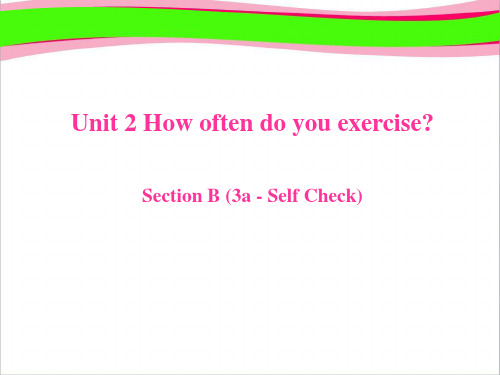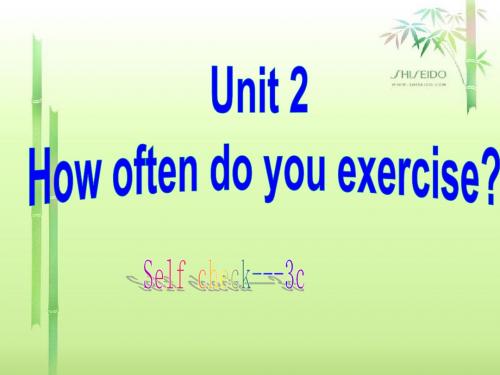Unit2 How often do you exercise (3)
- 格式:docx
- 大小:13.41 KB
- 文档页数:5

Unit 2 How often do you exercise? Section B 3a-Self Check 课件(共26张PPT)(共26张PPT)Unit 2How often do you exerciseSection B 3a-self check1) 复习询问或谈论别人饮食、锻炼的频率、休息的时间及选择不同频率的理由。
2) 能够运用所给的提示,完成对某人饮食习惯的描写。
3) 总结回顾所有的频率词,并学会运用所学的频率词来谈论某人的生活习惯。
surf the Internet ( always)I always surf the Internet.What do you usually do on weekends(usually)She usually plays the piano.What does she usually do on weekendsoftenShe often goes shopping.What does she usually do on weekendssometimesHe sometimes reads the book.What does he usually do on weekendsalwaysusuallyoftensometimeshardly evernever从不,从未很少,几乎不有时经常,常常通常,一般总是100%0%频率副词Always:总是. 表示动作的重复或状态的延续。
Usually:通常. 表示很少有例外。
Often:经常.表示动作的重复, 但不如usually那么频繁, 中间有间断。
Sometimes:有时. 表示动作偶尔发生。
Hardly:几乎不”+ever:强调。
Never:从未100%alwaysusuallyoftensometimeshardly ever≥ 80%never0%≥ 60%≥ 20%<5%位置:实V之前, be V或助V后。
![英语八年级上册Unit2Howoftendoyouexercise[八上Unit2A-3]](https://img.taocdn.com/s1/m/b1072a4549d7c1c708a1284ac850ad02de8007d6.png)



Unit 2 How often do you exercise?Section A (2d-3c)一、教学内容1.重点单词:maybe,least2.重点短语:at least3.重点句式:—How often does he play soccer?—He plays at least twice a week.—How often do you go to the movies?—I go to the movies maybe once a month.二、教学目标1.知识目标:(1)复习运用频率词汇及询问活动频率。
(2)一般现在时态的熟练运用。
2.能力目标:询问课余活动的问句(What do you usually do on weekends?)和使用频率副词表达的答语。
3.情感目标:通过本单元的学习,培养学生的逻辑表述能力,激发学生的积极思维,并使学生互相了解,增进友谊,加强人际交往,以形成良好的人际关系。
三、重难点1.频率副词的用法2.How often引导的询问做事频率的特殊疑问句及答语3.一般现在时态四、教学准备课件,多媒体五、教学过程Step 1Lead-inHow often do you watch TV?I watch TV every day.How often do you exercise?I exercise twice a week.How often does he exercise?She exercises twice a week.Now please practice the conversations like this with your partner.Step 2Presentation1.完成教材2d的任务1)学生自读对话,回答下面的问题:1.Is Claire free next week?No, she isn’t.2.How often does Claire have dance lessons?Once a week.3.How often does Claire have piano lessons?Twice a week.4.What does Claire do on Tuesday?She plays tennis.5.Does Jack want to join them?Yes, she does.2)大声朗读2d对话,读熟后与小组成员结对分角色表演对话。

Unit 2 How often do you exercise?内容提要:1.频度副词2.How及How短语短语引导的特殊疑问句一、频度副词➢旧知识复习1.副词:用来修饰动词、形容词、副词等的词。
2.副词的分类:副词可分为时间副词、地点副词、方式副词、程度副词、频度副词、疑问副词、关系副词、连接副词等,以下为7,8年级常见的副词。
(1)时间副词:表示动作发生的时间ago以前;now现在;today在今天;tomorrow在明天;yesterday在昨天;soon很快;just now 刚刚;then那时;finally最终;recently最近...注意:句中出现不同的时间副词,应使用相应的时态。
比较下列句子:Linda didn’t go to school yesterday.Jenny is singing now.He will e tomorrow.Tom left the classroom just now.(2)地点副词:表示动作发生的地点back在后面;everywhere到处;home在家;here这儿;there 那里;outside在外边;outdoors 在户外;indoors 在室内;down在下边;up在上边...注意:地点副词前一般不用介词比较下列句子:He went home yesterday.(home是副词,前面不用to)He went to town just now.(town是名词,前面要用介词to)(3)方式副词:表示动作发生的方式slowly 缓慢地;quickly快速地;carefully细心地;clearly清楚地;politely 有礼貌地;hard 努力地;loudly大声地...(4)程度副词:描述动作、行为或状态的程度much非常,很;little很少;very很,非常;pretty 相当,很;nearly几乎;really 真正地;enough 足够;too太;too much太多;much too 太...(5)疑问副词:主要用于引导特殊疑问句when什么时候;how怎样,如何;where在哪里;why为什么...(6)频度副词:表示事情发生的频率always总是;hardly几乎不;sometimes有时;never从不;seldom 极少;usually通常;often 经常➢随学随练1.用所给词适当形式填空,注意句中的时间副词。
Unit2 how often do you exercise一、同步知识梳理重点单词1.家务事2.几乎不3.曾经4.一次5.两次6.因特网7. 节目8.满的)9.秋千 10.大概 11.最小12.咖啡13.健康 14.结果 15.百分之..16.在线17.电视节目 18.即使 19.穿过20.头脑21.身体 22.这样的 23.在一起24.死亡25.作家 26.牙科医生 27.杂志28.然而29.比 30.几乎 31.毫无32.较小 33.得分?重点词组1.2.几乎不 2.摇摆舞3.至少4.垃圾食品5.例如6.多于7.少于重点句型1.What do you usually do on weekends;I always exercise.2.What does she do on weekendsShe sometimes goes shopping.3.How often do you you go to the moviesI go to movies maybe once a month.Section Aoften do you exercise 你多久做一次运动—【解析1】how often/ how long / how far/ how soon辨析》【解析2】exercise v 锻炼=do sports= play sports【短语】take /have/do exercise 做运动 do morning exercise 做早操 do eye exercise 做眼保健操2.3.What do you usually do on weekends 你在周末做什么【解析1】频度副词【注】:频度副词表示多长时间做某事一次, 用在实义动词之前,系动词、助动词、情态动词之后。
We often clean the classroom every day. 【拓展】some time /sometime/some times/sometimes 【口诀】:分开是一段,合起是某时; 分开s 是倍次,合起s 是某时 (1)some time 一段时间,做时间状语 ;It takes sb. some time to do sth. 做某事花费某人多长时间(2)(3)sometime adv. 在某个时候,I hope to visit the USA _____ in the future.A. sometimesB. some timesC. sometime D . some time(3) some times 名词词组,“几次,几倍” sometimes=at times 有时 (一般现在时的标志词) 【解析2】weekend/weekday 辨析 【解析】on weekends = on Saturday and Sunday 在周末on weekdays= from Monday to Friday 在工作日3. Hardly ever 几乎从不【解析】hard (1)adv 努力地,猛烈地work hard 努力工作study hard 努力学习:(2) adj. 困难的,艰难的=difficult◆It’s hard/difficult for sb. to do sth. 做某事对某人来说是困难的It’s hard for us ____________(finish) the work without other ’s help.【拓展】hardly adv “几乎不,从来不”,表否定意义,常与can ,any ,ever 连用。
Unit2 How often do you exercise?Section B 3a--self check一.根据句意以及汉语提示完成单词。
1.Anna's father is a (牙医).If there's something wrong with your teeth, you can ask him for help.2.More (比)twenty students in our class went to the park yesterday。
3.The library has all kinds of books,(期刊,杂志)and newspapers and you can choose(选择)any of them to read.4.They old man has three sons, but (没有一个)of them wants to live with him.5.Susan often stays up late and sleeps (较少)than six hours every night.二.用括号内所给的单词的适当形式填空。
1.Doing sports is good for our minds and (body).2.I read much (little) now than I did at school.3.Tom got ninety-seven (point) in the math test.4.Do you like the (writer) new book?5.Look! The flowers are (die). Can you get some water?三.单项选择。
()1.--My two teeth are bad. What should I do?-- You should .A.see a doctorB.go to the dentistC.have a good restD.eat nothing()2.Taking exercise a good way our bodies.A.Are, to keepB.are, keepingC. is,keepingD. is, to keep()3.Don't to late tonight, or you will feel sleepy in class tomorrow.A.get upB.put upC.stay upD.wake up()4.There are 50 students in our class. 75% students like going hiking.what does twenty five percent students mean?A.None of the students.B.All the students.C.Most of the students.D.Some of the students.()5.The birds singing came into our room the window and woke me up in the early morning.A.downB.fromC.throughD.across四.根据汉语意思完成句子。
八年级英语上册Unit 2 How often do you exercise知识点归纳八年级英语上册Unit 2 How often do you exercise知识点归纳一、词组、短语:1、help with housework 帮助做家务活,2、go shopping 购物,3、on weekends 在周末,4、how often 多久一次,5、hardly ever几乎不,6、once a week 每周一次,7、twice a month每月二次,8、go to the movies去看电影,9、every day 每天,10、use the Internet上网/用网,11、be free有空,12、have dance and piano lessons 上舞蹈钢琴课,13、swing dance摇摆舞14、play tennis 打网球,15、stay up late熬夜,16、at least至少,17、go to bed early 早睡,18、 play sports 锻炼身体,19、be good for 对…有好处,20、go camping去野营,21、in one’s free time 在某人的空闲时间,22、not….at all 根本不,23、the most popular 最流行,24、such as例如,25、go to the dentist去看牙医,26、more than 超过/多于,27、Old habits die hard.旧习惯难改。
28、 hard=difficult 困难的,29、less than 少于/不到二、重要句子(语法):What do you usually do on weekends你周末通常做什么 I always exercise.总是锻炼身体。
What do they do on weekends他们周末干什么 They often help with housework.他们经常帮助干家务活。
Unit2 How often do you exercise?
教学设计
(Section A 1a –2c)
教学目标
1、知识与技能:通过本课学习,学生能够谈论日常活动和活动的频率和次数。
2、过程与方法:通过本课学习,学生体验合作价值,认识交流意义,在教师指导下学会自主归纳“How often do you....”的答语,学会正确做事;掌握本课话题的写作技巧。
3、情感态度与价值观:学生在学习的过程中收获快乐、树立合作精神和团队意识。
学生通过对不同活动的学习,端正做事态度身心健康发展。
3重点难点
教学重点:
1、学生能够谈论日常活动
2、学生能够谈论活动的频率和次数
3、学生能就自己的日常活动进行有效的叙述和写作。
教学难点:
1、学生自然流利的、真实的谈论日常活动以及活动的频率和次数。
2、学生能就自己的日常活动进行有效的叙述和写作。
3、学生树立正确的日常活动态度,身心健康发展。
4教学策略选择与设计
1、教学理念:教学“谈论日常活动和活动的频率和次数”让学生在语言知识与技能方面得到收获,过程教学中注重培养学生的合作和自主归纳能力,情感态度方面则着眼于培养学生的分辨能力和选择意识,使学生身心健康。
2、教学与活动策略:学生合作讨论归纳如何谈论活动的频率和次数。
5教学过程
Step1 Organizing the class and leading in new class
教师活动
1.Tell the class what we’re learning this class.
2.Help students to do 1a and ask them other activities.
学生活动
Do 1a and think of other activities.
教学设计意图
1、简单介绍本课的要学习的内容。
2、完成1a,进一步搜集其他活动,为完成1b学习任务服务。
媒体设计思想
导入新课,让学生了解本课所学内容。
Step2 Learning new words do 1b&1c
教师活动
I introduce my own weekend activities.
学生活动
Students learn about my activities in order to learn new words and frequency words“ always\often\usually\sometimes\hardly ever\never.
教学设计意图
让学生在自然亲切的语境中学习新的词汇。
媒体设计思想
学生了解教师活动,并学习新词汇并使用频率副词。
Step3 Listening
(一)Listening One
Before-listening
Learn more about frequency words and know the differences between them.
While-listening
1)Students listen to 1b and write the activities.
2) Students listen again and fill in the blanks with frequency words.
Post-listening
Students practice the conversation in 1b and make their own conversations.
教学设计意图
1、学生在前面的练习基础上完成1b。
2.通过增加听力练习,使学生进一步学习和掌握频率词。
3.学生练习对话并将对话真实化。
(二)Listening two
Before-listening
Teacher leads students to be familiar with ChengTao’s activities and “How often he does it?”While-listening
1.Students listen to 2a. Number the activities [1--5] in the order they hear them.
2. Students listen again and match the activities in 2a with how often ChengTao does them? Post—listening
1.Students do 2c .Fill in the chart and then make conversations.
2. .Encourage the students to say out the ways to answer “How often do you…?”.
教学设计意图
1、继续听力练习,进一步熟悉重点句型。
2、培养学生自主归纳的学习能力和习惯。
媒体设计思想
1、核对听力答案,进一步巩固频率副词的使用。
2、让学生明确任务,根据2c要求进行对话练习。
Step4 Showing ChengTao’s weekend activities
教师活动
Lead the students to analyze the article about ChengTao’activities by finding the topic sentence, body part and conclusion。
学生活动
Students are leaded to analyze the article.
2.Try to say something about their own activities.
教学设计意图
让学生学会根据给定的信息进行叙述,通过对范文的句子和结构的分析,让学生掌握写作技巧。
2、学生试着说一些自己的周末活动。
Step5 Home work
Listen to Section A 1b&2a and imitate the
intonation and stress.(听Section A 1b&2a,模仿语音语调)
Write a short passage(文章) about how often you do
different activities in 2a.
Step 6 小结
板书设计
Unit2 How often do you exercise?
(Section A 1a –2c)
.How often do you do…?
1)Always\usually\often\sometimes\hardly ever\never …
2)Once\three times a week\month\year.
3)Every day\week\month.。